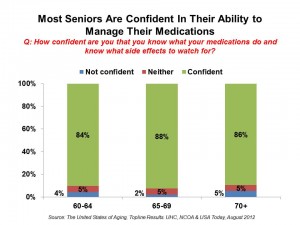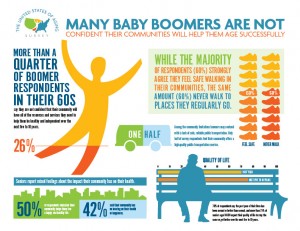Most seniors look forward to aging in place, and are confident in their ability to do so. Such is the top-line feel-good finding from the National Council on Aging‘s (NCOA) survey, The United States of Aging, sponsored by USA Today and United Healthcare.
A majority of seniors have a sense of purpose and plans for their future. Three-fourths of older Americans say staying physically fit through exercise and proactively managing their health is important.
However, only 36% of seniors say they exercise or engage in physical activity every day. 11% never do.
The most common chronic conditions noted by seniors in the survey are high blood pressure, diabetes, arthritis, high cholesterol, asthma, cancer, cardiac failure, COPD, coronary artery disease, and osteoarthritis. Among seniors with chronic conditions, 80% are confident they can manage their conditions so as not to need to see a doctor. And, 84% of older Americans believe they will be able to do the things they need to to maintain their health over the next 5 to 10 years. Furthermore, a whopping 92% of seniors say they can communicate with their doctors regarding health questions and concerns.
Underlying seniors’ general upbeat perspective and confidence in self-care is some financial concern, split by gender: more men say they’re financial plans for retirement are sufficient than women, and among seniors still working, 73% of women say they work because they need the money, vs. 65% of men. 46% of senior women say they’re working for the benefits, compared with 33% of senior men.
Financial insecurity is also more pronounced among senior women than men when it comes to long-term care. Among seniors who rely on LTC or support services, 41% consider it easy to afford the help, compared with 25% of women. Among seniors who don’t need LTC yet, 38% aren’t confident they’ll be able to afford the services if they need them in the future.
NCOA conducted this survey noting that 77 million baby boomers turn 65 at a rate of 10,000 per day. Pressures will mount among this growing aging population challenging housing, transportation, social services, cultural offerings, and health and wellness programs.
The poll was conducted in May and June 2012 among 2,250 U.S. adults age 60 and older, in Upstate New York, Milwaukee, Miami, Dallas, and Orange County, CA.
 Health Populi’s Hot Points: This week’s New Old Age column in the New York Times is titled, More Older Adults with Multiple Problems. The column reports, “These are statistically significant increases, found across all racial and ethnic groups examined — blacks, whites, Hispanics — and most income groups. By 2009-10, 45 percent of the respondents older than 65 had two or more chronic diseases, including stroke, emphysema, asthma and kidney disease. A decade earlier, only 37 percent did. That’s alarming, because people with more than one chronic disease have a harder time managing their health. They’re more likely to be hospitalized. They fill more prescriptions and make more doctors’ visits. They cost themselves and the nation more.”
Health Populi’s Hot Points: This week’s New Old Age column in the New York Times is titled, More Older Adults with Multiple Problems. The column reports, “These are statistically significant increases, found across all racial and ethnic groups examined — blacks, whites, Hispanics — and most income groups. By 2009-10, 45 percent of the respondents older than 65 had two or more chronic diseases, including stroke, emphysema, asthma and kidney disease. A decade earlier, only 37 percent did. That’s alarming, because people with more than one chronic disease have a harder time managing their health. They’re more likely to be hospitalized. They fill more prescriptions and make more doctors’ visits. They cost themselves and the nation more.”
The seniors polled by NCOA are optimistic about their ability to manage their growing burden of chronic disease. One question asked seniors, “How confident are you that you know what your medications do and know what side effects to watch for?” The results of that question are shown in the bar chart.
There is a chasm between seniors’ confidence in their perceived understanding of how to take medicines and what clinicians and researchers have found: that is, lack of medication adherence, health il-literacy when it comes to understanding how to take prescription meds, and an alarming number of medication accidents that result in some seniors’ adverse events where people land in emergency departments or morgues.
It is heartening to see that seniors feel upbeat about their future and ability to self-manage. Confidence bolsters self-efficacy in health — a very good thing indeed. The fact remains that caregivers, clinicians and communities alike must bolster seniors’ health efficacy and health literacy.





 Interviewed live on BNN Bloomberg (Canada) on the market for GLP-1 drugs for weight loss and their impact on both the health care system and consumer goods and services -- notably, food, nutrition, retail health, gyms, and other sectors.
Interviewed live on BNN Bloomberg (Canada) on the market for GLP-1 drugs for weight loss and their impact on both the health care system and consumer goods and services -- notably, food, nutrition, retail health, gyms, and other sectors. Thank you, Feedspot, for
Thank you, Feedspot, for  As you may know, I have been splitting work- and living-time between the U.S. and the E.U., most recently living in and working from Brussels. In the month of September 2024, I'll be splitting time between London and other parts of the U.K., and Italy where I'll be working with clients on consumer health, self-care and home care focused on food-as-medicine, digital health, business and scenario planning for the future...
As you may know, I have been splitting work- and living-time between the U.S. and the E.U., most recently living in and working from Brussels. In the month of September 2024, I'll be splitting time between London and other parts of the U.K., and Italy where I'll be working with clients on consumer health, self-care and home care focused on food-as-medicine, digital health, business and scenario planning for the future...